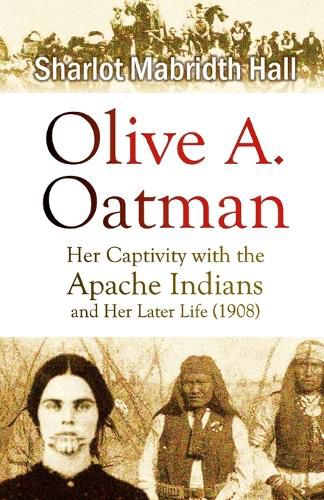Readings Newsletter
Become a Readings Member to make your shopping experience even easier.
Sign in or sign up for free!
You’re not far away from qualifying for FREE standard shipping within Australia
You’ve qualified for FREE standard shipping within Australia
The cart is loading…






This title is printed to order. This book may have been self-published. If so, we cannot guarantee the quality of the content. In the main most books will have gone through the editing process however some may not. We therefore suggest that you be aware of this before ordering this book. If in doubt check either the author or publisher’s details as we are unable to accept any returns unless they are faulty. Please contact us if you have any questions.
"Sharlot Hall...a noted historian of Arizona, had informed him that Olive had two children while among her captors." - The Oatman Massacre: A Tale of Desert Captivity and Survival (2014) "Sharlot Hall moved to Arizona...in 1882...traveled through the territory to collect oral histories from old settlers...served as territorial historian." - Derzipilski, Arizona (2004) "In 1906 Joseph Fish claimed that Arizona historian Sharlot Hall had told him Olive had two children, one of whom still visited Fort Yuma."- Captive Arizona, 1851-1900 (2009) "Sharlot Mabridth Hall was an unusual woman for her time: a largely self-educated but highly literate child of the frontier...Her earliest memories were of Comanche raids." -sharlothallmuseum.org Perhaps no single person is more qualified to tell the famous story of the Oatman captivity by Apaches than Arizona territorial historian Sharlot Hall (1870 -1943), who herself had memories of Apache raids and interviewed the early pioneers of Arizona. In 1908, Hall would write a short, but historically important and frequently cited, 20-page account of the Oatman captivity, titled, "Olive A. Oatman: Her Captivity with the Apache Indians and Her Later Life." In introducing her work, Hall writes: "Stories of the captivity of white women with various Indian tribes have been part of the romance and tragedy of the frontier from New England westward; but the Apaches of the Southwest seldom burdened themselves for any length of time with white captives of either sex, and Olive A. Oatman is the only white woman who survived the hardships of an extended captivity among them."
$9.00 standard shipping within Australia
FREE standard shipping within Australia for orders over $100.00
Express & International shipping calculated at checkout
This title is printed to order. This book may have been self-published. If so, we cannot guarantee the quality of the content. In the main most books will have gone through the editing process however some may not. We therefore suggest that you be aware of this before ordering this book. If in doubt check either the author or publisher’s details as we are unable to accept any returns unless they are faulty. Please contact us if you have any questions.
"Sharlot Hall...a noted historian of Arizona, had informed him that Olive had two children while among her captors." - The Oatman Massacre: A Tale of Desert Captivity and Survival (2014) "Sharlot Hall moved to Arizona...in 1882...traveled through the territory to collect oral histories from old settlers...served as territorial historian." - Derzipilski, Arizona (2004) "In 1906 Joseph Fish claimed that Arizona historian Sharlot Hall had told him Olive had two children, one of whom still visited Fort Yuma."- Captive Arizona, 1851-1900 (2009) "Sharlot Mabridth Hall was an unusual woman for her time: a largely self-educated but highly literate child of the frontier...Her earliest memories were of Comanche raids." -sharlothallmuseum.org Perhaps no single person is more qualified to tell the famous story of the Oatman captivity by Apaches than Arizona territorial historian Sharlot Hall (1870 -1943), who herself had memories of Apache raids and interviewed the early pioneers of Arizona. In 1908, Hall would write a short, but historically important and frequently cited, 20-page account of the Oatman captivity, titled, "Olive A. Oatman: Her Captivity with the Apache Indians and Her Later Life." In introducing her work, Hall writes: "Stories of the captivity of white women with various Indian tribes have been part of the romance and tragedy of the frontier from New England westward; but the Apaches of the Southwest seldom burdened themselves for any length of time with white captives of either sex, and Olive A. Oatman is the only white woman who survived the hardships of an extended captivity among them."